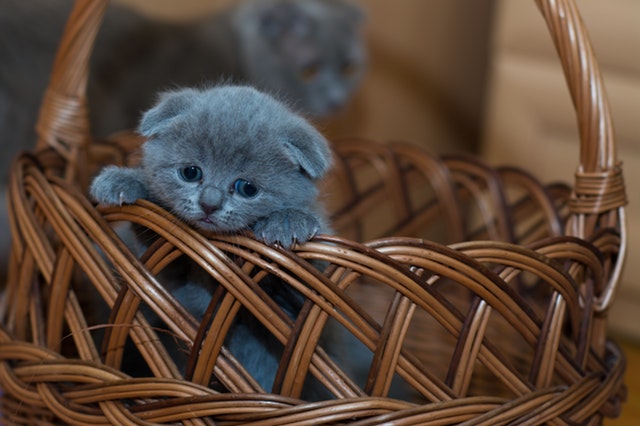When my friend’s cat had Cystitis for the first time in her life, I had this question in my mind, what is cystitis in cats? The term cystitis means inflammation of the urinary bladder. However, as a cat owner, you want to know more about Cystitis and how to treat it and prevent it from happening again.
Inflammation in any organ inside our fluffy cats will cause unpleasant feelings and pain for our cats. Cats will show this pain and sickness in different ways depending on the inflammation and which organ is affected. So, it is mandatory to have a good relationship with your cat and always try to understand and talk to it.
When you have a good relationship with your cat, it will feel more comfortable around you to complain in a way only you can understand.
Table of Contents
What Is Cystitis In Cats
The term Cystitis is an inflammation of the bladder, Cystitis associated with feline idiopathic Cystitis, feline lower urinary tract disease, and feline urological syndrome.
Although Cystitis is a general term, there is a common form of it that occurs in female and male cats. The disease is also known as FUS (Feline Urologic Syndrome) or FLUTD (Feline Lower Urinary Tract Disease).
Your cat will start to show pain during urination or uncomfortable feeling all that due to the inflammation. Also, the disease will force your cat to urinate in different places in the house other than its litter box; it is often on hard surfaces such as bathtubs and sinks.
As we mentioned above, Cystitis is associated with Feline Idiopathic Cystitis, and that means the direct cause of feline Cystitis is unknown.
The same as in humans, this disease is more common in female cats than in male cats. However, the cause of the inflammation in women are bacterial infections; in cats, there is no single definitive cause.
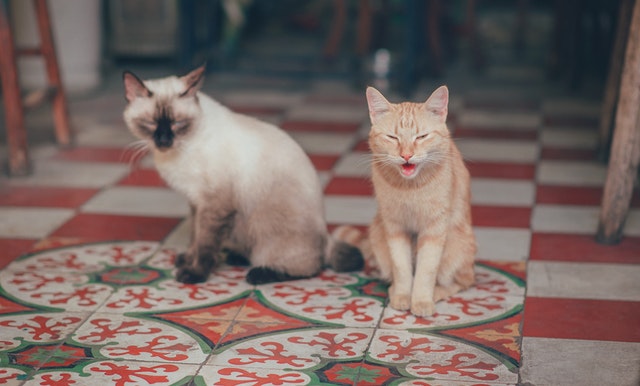
What Is The Cause Of Cystitis In Cats
Unlike humans, Cysistis in cats is a multifactorial disease, which means there is no single definitive cause. Some several underlying causes and factors develope this disease. Bacterial infections are the most common cause of cystitis in humans as well as dogs. But not in cats.
Additionally, stress is one of the significant factors and plays a big role in developing cystitis in cats.
Indoor cats are more prone to develop Stress than cats that allowed to go outside. Also, sedentary and lazy life for your cat without activities can be the cause of obesity, which can be a factor in developing cystitis.
Symptoms Of Cystitis In Cats
The inflammation begins to show different symptoms and signs once it is initiated and started to affect the bladder. There are various symptoms you may notice your cat having, such as:
- Licking the genitals
- Lying on cold surfaces, which will help your cat to ease their pain.
- Pain when urinating
- Irritability and changes in your cat personality
- Going to the bathroom more often with little urine passed
- Frequent trips to the litter box
- Blood is present in the urine
- Urinating in places other than the litter box
- Odorous urine is being exhibited
These symptoms will be more obvious for indoor cats than outdoor cats because it is challenging to observe outdoor cats while they are outdoors. Also, if you notice any unusual behavior, it can be a sign for you to check on your cat as it may have a problem and one of which is Cystitis.
Besides, as a cat owner, you already know that cats always try their best to hide their pain and sickness as it is part of their instinct not to look weak.
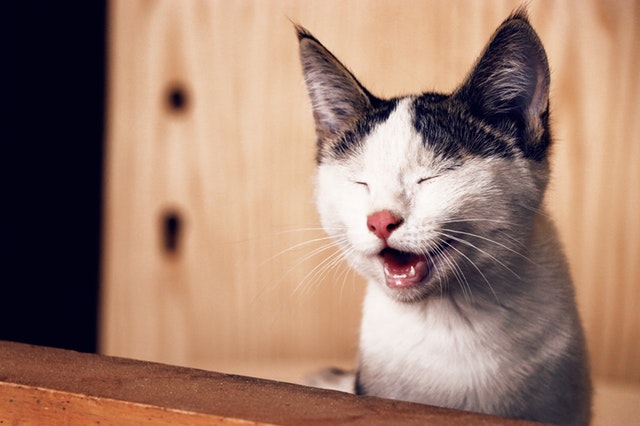
Diagnosis Of Cystitis In Cats
Different diseases can cause such symptoms; Cystitis one of them. The Diagnosis of any illness starts by ruling out other causes.
As for Cystitis, various conditions such as urinary tract infection, bladder abnormalities, bladder stones, and other abnormalities can cause such symptoms. That’s why it is essential to take your cat to your veterinarian.
Your vet will start testing your cat with different tests that are frequently performed include:
1- A Urin-analysis, this test is a great way to check for all abnormalities in the urine. Your vet will search for abnormal substances such as the presence of blood, protein, crystals, or other unusual substances that will give him a hint about the problem your cat facing.
Also, checking the pH (to determines how acidic the urine is) and the specific gravity (to check the concentration of the urine) is as important for the diagnosis.
2- A blood test is a necessary test to check different results within your cat blood. The test includes a complete blood cell count, chemistry profile ( which evaluates the function of different organs such as the kidneys and liver).
3- Radiological imaging such as Abdominal X-ray and Ultrasound can be a choice for your vet to check the bladder and to role out the presence of stones in there.
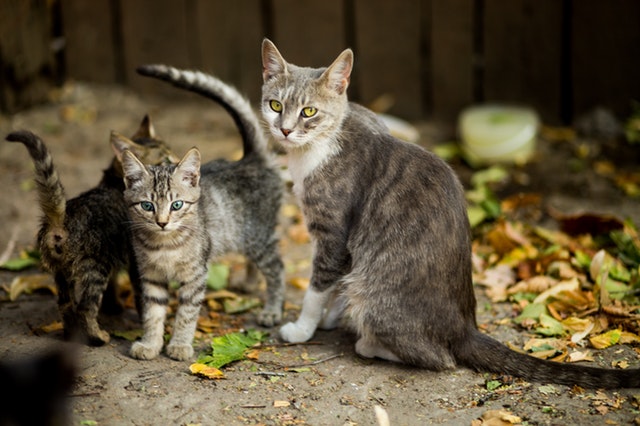
Treatment Of Cystitis For Cats
The treatment of cystitis is not only solving the cause but modifying various things in your cat live to improve its overall health.
The treatment will begin by modifying your cat’s environment to help reduce ant stress your cat got, improve your cat’s diet, medications for pain, and your vet may prescribe other medications to alter your cat’s mental state. Also, some natural remedies proved to be beneficial for a cat’s urinary tract problems.
Modifying your cat’s environment is so important. Cats are more prone to develop stress with any change in their normal life. MEMO is the term you may see or hear, which stands for Multi-modal environmental modifications, which describes the attempt to reduce the cat’s stress level.
Dietary modifications are necessary to be modified and improved, and you should always follow your vet’s advice and instruction for the best outcome. Also, hydration is the key to keep your cat’s urinary tract system healthy.
Pain medications are a choice for your vet to prescribe, and essentially, it is more often prescribed in case of interstitial cystitis to relieve the discomfort caused by the inflammation within the bladder.
Pheromones are often prescribed by your vet to help reduce the stress level for your cat.
Also, some other medications that your veterinarian may advise you to get, which may include antidepressants, to act as an alternative treatment in case all of the above failed to help your cat.
Is Cystitis For Cats Likely To Recur?
Unfortunately, Cystitis may recur in many cats. Also, it can be resistant to all treatments and cause chronic problems. However, it is essential to keep doing all that necessary to improve your cat’s health and modify your cat environment.
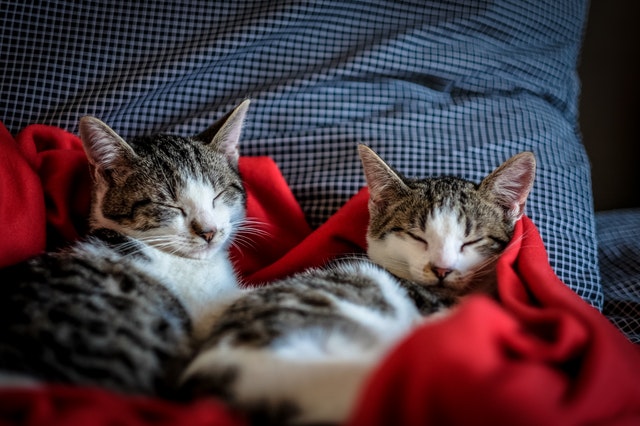
Can Cystitis For Cats Be Prevented?
Minimizing the risks for recurrence is the best way to prevent it from happening. Although it is not 100% prevention, adjustments of your cat’s diet and life can help to achieve that.
Also, modifying your cat’s environment for a stress-free life is vital to minimize the risks of developing Cystitis. To sum it up these five ways to Prevent Feline Cystitis:
1. Hydration
Hydration is crucial to keep your cat’s urinary tract system healthy and intact. So, make sure always to provide your cat with adequate water.
Also, Consider getting a bubbler or fountain to encourage your cat to drink more since many cats love to drink running water. Don’t forget to change out your cat’s water frequently to keep clean and encourage your cat to drink more water.
2. Keep Your Cat’s Litter Box Clean
Cleaning your cat’s litter box is vital to prevent Cystitis. So make sure you keep it clean all the time, so your cat has all the reasons to pee regularly. Holding the pee is the fastest way to develop urinary tract problems.
3. Provide Your Cat The Best Food
Dry food is excellent. However, wet food can be a better choice since it contains more water within it, and it is a great way to keep your cat hydrated.
4. Provide Your Cat A Stress-Free Life
As we mentioned above, stress is one of the significant factors to develop Cystitis in cats. Modifying your cat’s life to have a stress-free life is essential to prevent the disease from developing.
To avoid having an anxious cat, keep things consistent in their life with minimal changes. Also, bringing a new pet to your house is a common reason for an anxious cat, so make sure to take all measures to ease the transition before getting a new pet.
5. Keep Your Cat In Shap – Avoid Obesity
Filling your cat’s schedule with activities and giving it different toys is a great way to keep it in shape and avoid obesity. Obesity is a significant factor for cystitis; not only that, it can cause many different diseases for your cat. So, try to keep your cat active and avoid any lazy life or overfeed it.
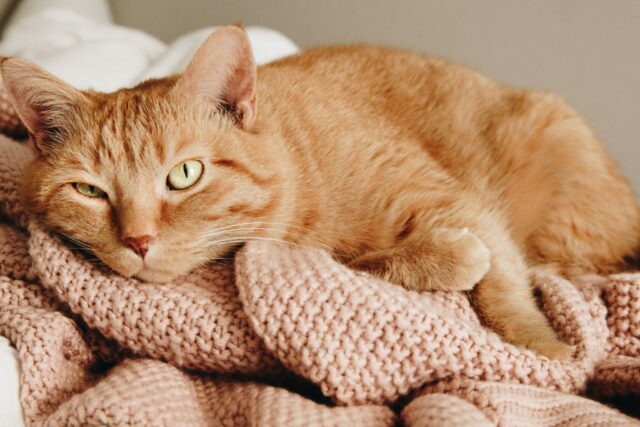
Keep Your Cat Healthy And Happy With Cystitis Free Life
After answering the question of what is Cystitis in cats, you have a good idea about this disease and how annoying and painful it can be. Yes, it is not a life-threating disease for your fluffy cat. But, it is essential to prevent it from keeping your cat happy and healthy.
Taking measures to keep your fluffy kitty healthy and prevent Cystitis from developing is easy to do. All you need to do is start doing them now. Modifying your cat’s life and the environment is essential for your cat’s overall health and growth, not only for Cystitis.
Cats are our family members; they live and eat with us. We have to keep them happy at all times, the same as our kids. They may not ask for your help because they can’t speak, but when you being to understand them and give your cat what it needs when it needs it, your cat will return this with so much of love.
So finally, I hope you found this article useful and informative. Let me know your answer. What do you think about this disease? Do you have more information or tips about What Is Cystitis In Cats? Write them down below.
If you have any other questions or different opinions about it, leave a comment below.
Today’s Quote:
“Cats are kindly masters, just so long as you remember your place.” — Paul Gray
You’ll Also Love These Posts:
Studies have shown if you like this blog article — you will also love the following posts.

